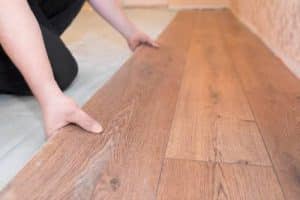
What are floating floors?
Have you ever heard of floating floors? Well, it is not your typical flooring. Floating floor installation does not require nails; instead, each board is locked to each other like a puzzle and is not attached to the sub-floor.
But are they secure? At Croydon Floors, we prioritise the stability of your flooring. This stability is owed to both the collective weight of the planks and the friction between the underlayment.
2 Common types of Floating Floor
Our floating floor installation can be either hardwood or laminate. These two may appear similar due to their outside resemblance. However, these flooring types possess distinct characteristics that set them apart.
Real wood Flooring
Real wood flooring is renowned for its simplicity and durability. Real wood flooring establishes a stable foundation within a space. Their appearance can rival that of oak timber flooring, giving you that timeless, elegant vibe without the hefty price tag.
While its installation might pose a challenge for DIY projects due to the need for specialised tools and skills, the result is a timeless floor crafted from solid natural wood, adding warmth and character to any room.
Laminate Flooring
Laminate flooring stands out for its practicality and ease of installation. Featuring a clear plastic wear layer, it offers reliable protection against scratches and daily wear.
Unlike hardwood, laminate floors adopt a floating installation method, requiring no fasteners for attachment to the subfloor, allowing for swift and straightforward placement. Its core material, made of fiberboard, contributes to its stability while providing flexibility and resistance to moisture, making laminate flooring an accessible and versatile choice for various spaces.
Choosing the right type of floating floor installation comes down to your budget and what you like. While comparing real wood and laminate is important, your decision depends on what you can afford and what style you prefer. Your choice is about balancing costs, looks, and what works best for you.

Why choose floating floor installation?
You might be wondering why floating floor installation is on the trend. People love them because they’re practical, affordable, and flexible. They’re the go-to choice for modern spaces, giving you both convenience and a cool look for your floors.
Simple Installation Process
- Unlike traditional methods, floating floors don’t require adhesives or nails for installation. Each piece effortlessly clicks or locks into place, simplifying the entire process.
- The innovative click-and-lock mechanisms ensure swift and hassle-free assembly, allowing for seamless installation without the mess or fuss of glues or nails.
Time and Cost Efficient
- Installing floating floors is notably quicker than traditional methods, saving considerable time during the installation process.
- The efficient installation translates to cost savings in both labour and materials, making it a budget-friendly option for homeowners.
Adaptability to Various Subfloors
- Floating floors exhibit versatility, allowing installation over various surfaces without significant preparation, simplifying the renovation process.
- They are an ideal solution for uneven or problematic subfloors, as they can easily adjust to irregularities, providing a smooth and stable finish.
Quick Use and Occupancy
- Once installed, floating floors are immediately ready for use, eliminating any waiting period for curing or drying.
- Unlike some traditional flooring methods, floating floors offer immediate occupancy, enabling swift enjoyment of the newly revamped space.
Selecting the right flooring partner is crucial; it ensures your floating floor installation meets your expectations and lasts for years to come. At our company, our team of experts is dedicated to guiding you through every step, guaranteeing a flooring solution tailored to your needs.
Reach out to us for a quote and discover how we can transform your space with quality flooring that stands the test of time.
- By: Croydon Floors
- Category: Uncategorised
- 0 comment
